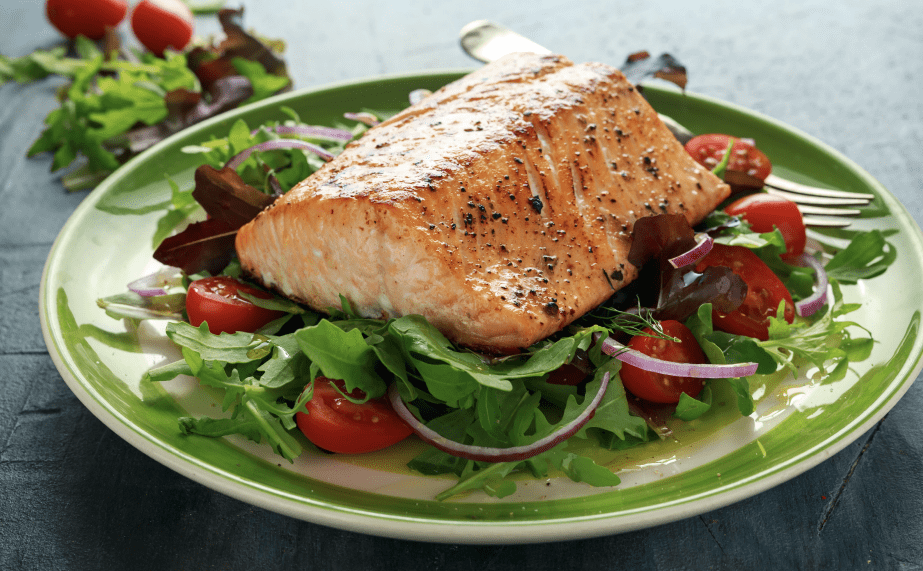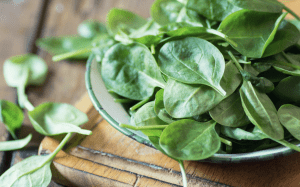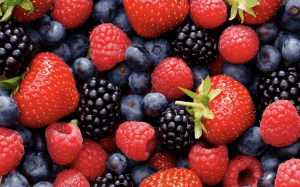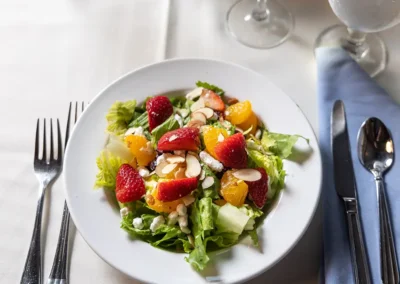Maintaining a diet rich in heart-healthy foods for seniors is essential for keeping our minds sharp and our bodies nourished, giving us the energy to do what we love. While a balanced diet is important at any age, proper senior nutrition becomes increasingly vital for older adults.
When seniors follow a heart-healthy diet plan, they significantly reduce the risk of cardiovascular disease, high blood pressure, and other serious health issues.So what kind of foods should you be incorporating into your diet plan for older adults ages 65 and above?
There are plenty of delicious heart-healthy foods for seniors to incorporate into meals and snacks. Many of these foods are also staples in Blue Zones diets – nutritional patterns found in regions where people consistently live past 100 years. These Blue Zones, like Okinawa (Japan), Sardinia (Italy), and Loma Linda (California), share dietary principles that promote longevity through plant-based foods, lean proteins, and healthy fats. One prominent principle is the “80% rule” – stopping eating when you’re 80% full – which helps maintain a healthy weight while ensuring proper nutrition.
Let’s take a look at some of our favorite heart-healthy foods for seniors that can help reduce the risk of heart disease.
9 Foods That Support Heart Health in Seniors

1. Lean Proteins
One of the most important sources of energy will come from your choice of protein. When considering what heart-healthy protein to choose, your best choice will be lean meats without skin. This includes turkey and chicken, which are excellent lean proteins for senior nutrition.
Having a significant source of lean meats in your meal will help you feel satisfied and can help you feel full for a longer amount of time – which prevents snack cravings and helps maintain a healthy weight.
But you don’t have to just have plain turkey or chicken; dressing them up with fresh seasonings and herbs adds flavor without adding calories that might contribute to high blood pressure.
If you’re not a fan of meat, you can also look to fish as a main source of protein and omega-3 fatty acids, which can reduce blood clotting and the risk of heart disease. Salmon, cod, and Atlantic mackerel are all tasty options that provide significant health benefits for older adults.
2. Eggs
Having eggs in the morning is a great way to start the day with protein. You may have heard that eggs are related to high cholesterol levels, but it’s important to know that this correlation has a few explanations.
Many people pair their eggs with bacon, sausage, or ham – processed foods that can increase the risk of heart disease. Some may fry their eggs in oil or butter, which can also have a connection with heart disease and affect cholesterol levels.
Poached or boiled eggs are simple ways to prepare them without adding calories in the process. For those who want to avoid cholesterol altogether, just eating the egg whites will give you the benefits of the egg’s protein but removes the cholesterol that might impact heart health for seniors.
3. Spinach and Kale
Leafy green vegetables are packed with vitamins and minerals and are easy to add to your diet. Fruits and vegetables, especially green leafy ones, are essential components of any heart-healthy foods list for seniors. Try adding greens to a breakfast smoothie, scrambling eggs with cooked spinach, or making a salad containing a handful of spinach or kale for a nutrient boost that helps reduce the risk of heart disease.

4. Reduced-Fat Dairy Products
Choosing reduced-fat dairy products means you can still enjoy milk, yogurt and cheese, but you’re not consuming the full fat that can raise cholesterol levels. Many reduced-fat dairy products can be part of a satisfying snack. A reduced-fat cheese stick with vegetables can help you with afternoon cravings while supporting senior nutrition.
Another great alternative is sheep and goat dairy products as they help the digestive systems cope better than many processed foods. These alternatives can be particularly beneficial for older adults looking to maintain a healthy weight while getting necessary nutrients.
5. Beans
Beans are loaded with protein and fiber, can help you maintain a healthy weight, and help your heart by lowering cholesterol levels. These plant-based foods are staples in Blue Zones diets, contributing significantly to the longevity of people in these regions.
While you can simply add beans to a protein bowl or salad to get its benefits, you can also get creative. For example, making a black bean burger can help you reduce your red meat intake, which will benefit your heart because red meat can contribute to heart-health issues and potentially high blood pressure.
There’s also no shortage of recipes for different bean soups, which you can always adjust to your tastes while maintaining their health benefits for senior nutrition.
6. Avocados
Avocados contain healthy fats. Incorporating healthy fats in your diet is important, but what makes a fat “healthy”? The following are healthy fats to look for in your diet:
- Omega-3 fatty acids
- Monounsaturated fats
- Polyunsaturated fats
Avocados are a great example of a food with monounsaturated fat, similar to olive oil, another heart-healthy staple. Try adding some avocado to a salad to make it more satisfying, or use an avocado to make fresh guacamole as part of your heart-healthy foods regimen for seniors.
7. Berries
Strawberries, blackberries, raspberries and blueberries are all delicious, sweet, bite-size, and full of antioxidants that can prevent or delay cell damage. Fruits and vegetables like berries are cornerstone elements of Blue Zones diets worldwide.
While eating berries on their own may not be a satisfying snack, you can easily add other things to berries to get their antioxidant benefits and still feel full. You could mix berries into Greek yogurt, a good source of potassium that can lower high blood pressure, creating a perfect snack for senior nutrition.

8. Almonds and Walnuts
Nuts and seeds like almonds, walnuts and pistachios are another great source of healthy fats. Almonds and walnuts are delicious and can add a satisfying crunch to a meal, or you can eat them by themselves as a snack. These plant-based foods provide essential nutrients that can help reduce the risk of heart disease.
Pairing nuts with fruits and vegetables, adding nuts to oatmeal in the morning, or putting a handful of nuts in a salad are all easy ways to add them to your diet.
Be careful to choose nuts that aren’t salted or candied, as the added salt and sugar are not heart-healthy and may contribute to high blood pressure or type 2 diabetes.
9. Brown Rice
When you’re eating heart-healthy meals, you’re going to need something on your plate that helps you feel full. Opting for whole grains will give you the best health benefit. Brown rice provides dietary fiber and magnesium, which both reduce your risk of heart disease and support overall senior nutrition.
Loma Linda Diet
The Loma Linda community in California is America’s only Blue Zone, where residents live approximately 10 years longer than the average American. Their diet, heavily based on plant-based foods like fruits and vegetables, nuts and seeds, and whole grains, incorporates nearly all the heart-healthy foods for seniors listed above.
Many Loma Linda residents follow a vegetarian or plant-forward diet, consuming lean proteins primarily from sources like soy milk, beans, and occasionally fish. Olive oil serves as their primary source of healthy fats. What’s remarkable about this community is that seniors who follow this eating pattern show significantly lower rates of heart disease, high blood pressure, and type 2 diabetes.
The Loma Linda diet exemplifies how a diet plan for seniors above 65 can dramatically enhance longevity and reduce the risk of chronic disease. Their success stems from not just what they eat, but also maintaining the 80% rule – eating until satisfied but not full – which helps maintain a healthy weight throughout life.
Other Ways To Reduce the Risk of Heart Disease
A heart-healthy diet is one of the many ways to prevent heart disease and other health issues, but adding healthy food choices in addition to making other lifestyle changes can make your overall well-being even better. Other ways to promote heart health for older adults include:
- Staying physically active with sports and regular exercise
- Managing stress through mindfulness and relaxation techniques
- Reducing alcohol consumption
- Quitting smoking
- Reducing processed foods consumption
- Keeping social – strong social connections help reduce the risk of heart disease and improve heart health
When you create a lifestyle with a balanced diet and the points above, you’ll be well on your way to having a healthier heart. Proper healthy meal planning for seniors can ensure all nine of these heart-healthy foods are consumed regularly, creating a balanced diet that supports overall wellness and helps maintain a healthy weight throughout your golden years.
Experience Senior Living at Canterbury Woods Williamsville
Canterbury Woods helps you keep your mind and body healthy through every aspect of life – even through food!
Our wonderful dining service team makes sure to always prepare healthy foods for our residents. Come take a personal tour, and stay for lunch on us and see for yourself!




